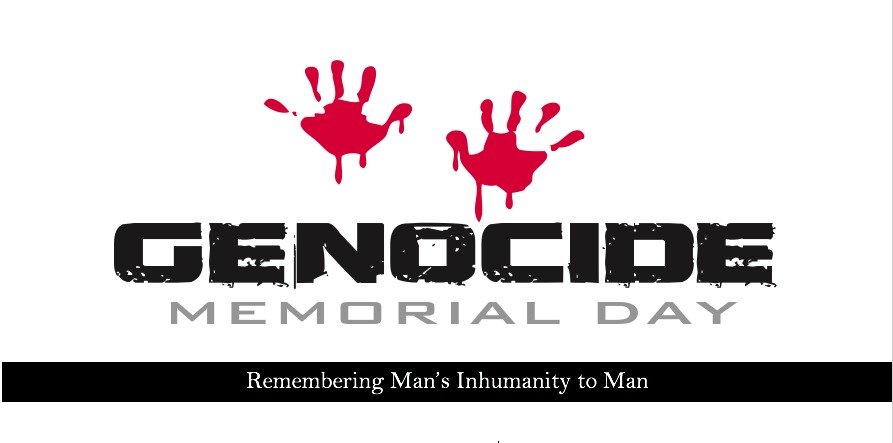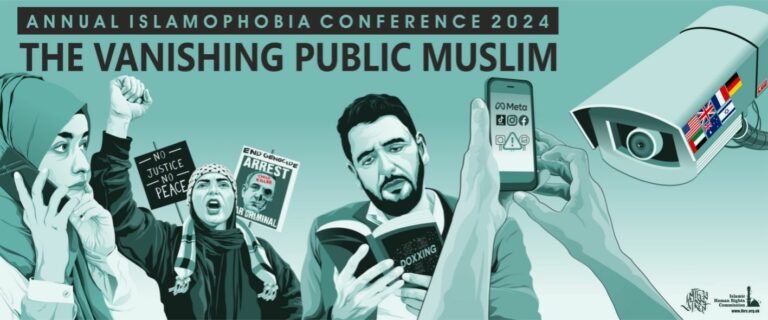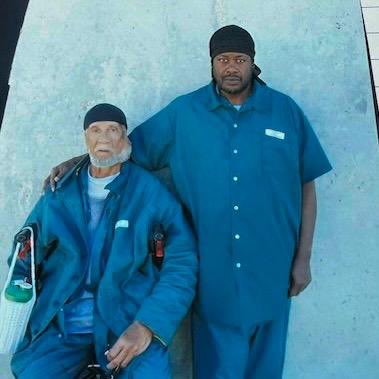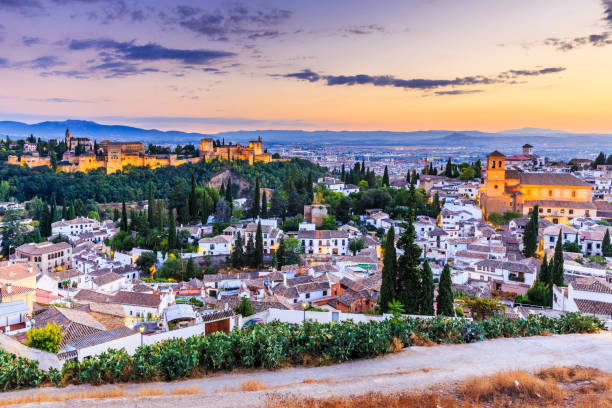Genocide Memorial Day (GMD) is a day focused on remembering man’s inhumanity to man. The theme for #GMD2019 in Geneva was “Failures of International Institutions in preventing genocide in conflict: The Holocaust, Palestine and Bosnia Herzegovina.
The GMD in Geneva was held on Saturday 7 December 2019 at Université Ouvrière de Genève (UOG)’s Berenstein amphitheatre. The first speaker was Raza Kazim from Islamic Human Rights Commission (IHRC) from London. Report continues below picture…
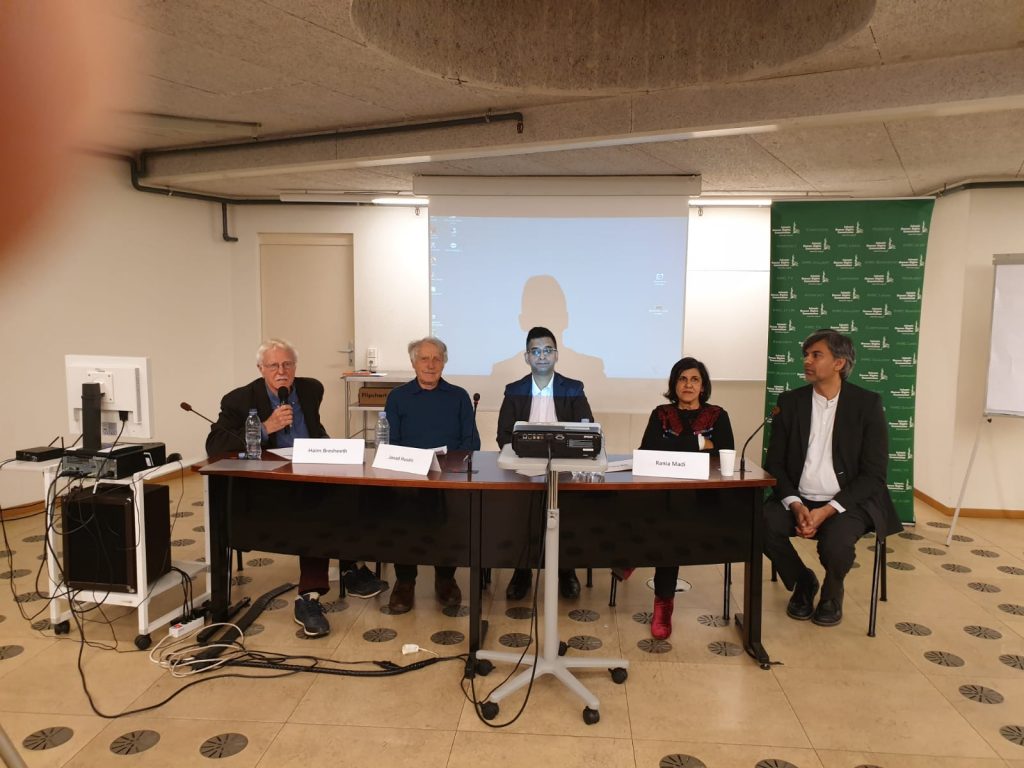
The second speaker was, president of the “Solidarité Bosnie” association, based locally in Geneva.
The third speaker was Professor Haim Bresheeth of London School of Oriental and Asian Studies.
The last speaker based locally in Geneva, Ms. Rania Madi, Lawyer and Legal advisor in the UN and the EU, working for the Palestinian NGO, BADIL, Resource Center for Palestinian Residency and Refugee Rights.
In session one, the event chair Jawad Husain gave a brief introduction on Genocide Memorial Day, and the Islamic Human Rights Commission.
He highlighted why it is important to have a Genocide Memorial Day Event in Geneva, giving these following points:
- “International Geneva: It is where the headquarters of the League of Nations used to be, houses ICRC, European headquarters of the UN, UN specialized agencies, CERN and many humanitarian and human rights NGOs.
- 1949 Geneva Convention, Rights and Protection during war.
- The Convention on the Prevention and Punishment of the Crime of Genocide was adopted by the United Nations General Assembly on 9 December 1948 as General Assembly Resolution 260. The Convention entered into force on 12 January 1951.[1] It defines genocide in legal terms, and is the culmination of years of campaigning by lawyer Raphael Lemkin.[2] All participating countries are advised to prevent and punish actions of genocide in war and in peacetime. As of May 2019, 150 states have ratified or acceded to the treaty, most recently Turkmenistan on 26 December 2018.”
Raza Kazim then spoke “on the background on Genocide Memorial Day organized by IHRC and why it’s important to commemorate Genocide Memorial Day.”
Mr. Kazim talked about “the dominant state actors, the colonial powers being involved in genocide or using proxies, to have proxies commit genocide.”
He talked about “the slogan used for genocide memorial man’s inhumanity to man. He talked about how it is commemorated every third week of January coinciding with the anniversary of the end of the 2008-09 Israel Gaza war, “Operation Cast Lead”.”
Kazim also talked about “the eight steps that lead to genocide. The eight steps are:
- Classification
- Symbolization, e.g. dress, ethnicity, skin colour
- Dehumanization
- Organization by the State: it is not necessary that state apparatus is involved, it can be a mob or informal method.
- Polarization: hate remarks, hate crimes like Jack Straw’s statement on the niqab or Boris Johnson’s “letter boxes, bank robbers” for Muslim women wearing the niqab.
- Ghettoization
- “It’s OK to Kill”
- Deny and cover the tracks and traces that may lead to your culpability, for example the Serbs in Bosnia.
In the case of Palestine or the Rohingyas in Myanmar you reject that there are any victims or you dehumanize them by using terms for the victims like “terrorists”, “vermin”, “flies”, “cockroaches” or deny their identity by saying “Palestinians don’t exist” or “Rohingyas are actually Bengalis”.
In the context of colonial expansion, the UK as well as other colonial and dominant powers have had a genocidal policy to expand their influence.
Genocide Memorial Day is important because many memorials on genocide are misused or pushed for an agenda, where there is no attempt to stop future oppression. As Muslims it is important to highlight the plight of oppression.”
The second speaker was Ivar Petterson who talked about Bosnia and the Srebrenica Genocide. “He first apologized that the survivors living in Geneva, Enver Husic, Abdurehman Abdic were not able to attend this event and he was talking on their behalf and other survivors. Mr. Petterson talked about how he has been active in Bosnia since 1991.
He mentioned the 1948 Convention on Genocide which defines genocide as the intention to exterminate a group of people or part of a group of people. It excludes immunity of government, government workers, military personal, non-state armed groups and citizens. The convention is rarely applied except in rare cases like in Arusha, Tanzania and at the ICJ in the Hague, Netherlands.
Mr. Petterson, described the historical background of Bosnia and Yugoslavia with the following key points:
- Bosnia’s history dates back to 13th century.
- Bosnian society is composed of Muslims, Catholics, Orthodox, Roma and Jews
- Before the arrival of Islam and the Ottomans, Bosnia had its own church separate from Orthodox and Catholic churches.
- Mystic Sufi Islam existed there before arrival of the Ottomans.
- Creation of Kingdom of Yugoslavia with Serbian domination
- 1939-45 Bosnia becomes one of the republics in Tito’s loose federation of Yugoslavia.
- Last major global event held in Yugoslavia and in particular Bosnia was the Winter Olympics in Sarajevo symbolizing unity and national cohesion
- Tito’s attempt to get closer with Muslims countries in the Non-Aligned Movement by labelling the Bosnians as Muslims, did not foster solidarity between Bosnians and the other republics that comprised the former Yugoslavia.
- April 1992: Agression by the Serbs, Serbs not designated as aggressors as the war is described as a civil war among ethnicities, Bosnian victimhood under Serb aggression is denied. An arms embargo imposed by the international community leads to the Bosnians’ inability to defend themselves.
There were 100,000 victims, mostly Bosnian Muslims, from 1992-1996. In May 1995, USA, UK, France decided to end the defence of the protected UN zones in Srebrenica and Zepa. Srebrenica was one of the pockets of resistance in Bosnia to Serb aggression. The dominant powers like US, UK and France wanted to compromise with the aggressors to end the war. Florance Hartman from the International Criminal Court has reported on the complicity of France, UK and US on what happened in Srebrenica.
The forcible transfer and abuse of between 25,000 and 30,000 Bosnian women, children and elderly which accompanied the massacre was found to constitute genocide, when accompanied with the killings and separation of the men.
Second Session:
The first speaker on the second session was Professor Haim Bresheeth of the School of Oriental and African Studies and Director of Camera Obscura Films. He first talked about “his family experience during World War II and the Holocaust. He talked about how 30% of the Jews died in the trains transporting them to the camps”. He talked about “the Treblinka death camp. As the Soviets got closer to Auschwitz camp, all the Jewish prisoners were marched out so that there would be no trace that there were killings at Auschwitz. Women went to Bergen-Belsen camp and men were sent to Gusen camp in Austria.”
According to Bresheeth, “Israel uses and abuses the Holocaust issue and memorials. Eleven million died, 5.5 million non-Jews disregarded. They included Russian soldiers, Polish Soldiers and citizens, Roma, Homosexuals, Trade Unionists, Communists etc.” He emphasized that “we should remember every single one of them.”
Bresheeth’s parents moved to Israel in 1948. His father was the first prisoner of conscience in the Israel Defense Forces (IDF). Professor Bresheeth described how “he became an anti-Zionist and his parents slowly changed over time from being anti-Zionist and pacifist to being Zionist”. He also talked about “the Book of Joshua in the Bible containing 26 chapters. The foundation of Zionist thinking about what they think of the Palestinians comes from this portion of the Bible. God commands the Israelites to wipe out the Gibeonites, living around Jerusalem and the population living in Canaan and the concept of Promised land in what is now Palestine”. He said “9,000 Palestinians were killed before the creation of Israel, by the British and their Jewish auxiliary forces during the British mandate”.
Taking up Mr. Raza Kazim’s mention of the eight steps leading to genocide Professor Haim said, “we should not wait for the eight steps, there may be eight or there might be just two, not all genocides are the same”. He also described “genocidal expulsions (not use ethnic cleansing used to by Karadjic and Mladic), ex-Yugoslavia, Myanmar and Palestine and incarcerating children as in the US and Israel. Racism and xenophobia, racism prevalent in society leads to genocide, Islamophobia is currently prevalent in the UK”.
The last speaker was Mrs. Rania Madi who talked about “the current situation in Palestine. She talked about the UN language saying that being a lawyer she knows that how words are used is important. She talked about how the word genocide is still not used for Palestine, instead there are other whitewash terms like ethnic cleansing, and other terms like war crime and crime against humanity.
USA, Israel, Turkey have not accepted the UN convention against genocide. Recognition means reparation and compensation. The case of Palestine is often described as incremental genocide. Eight million Palestinians are not permitted to return from where they were evicted. The UN Special Rapporteur on “the situation of human rights in the Palestinian territories occupied since 1967”, Richard Falk described what is happening in Israel and Palestine as Apartheid, another word no one wants to use to describe what is happening in Israel and Palestine”.
There is daily suffering, coercive measure, refugees, IDPs, an 8m tall wall dividing Palestinians and Israelis. The wall has prevented Palestinians’ free movement and access to land they previously owned. Professor Haim Bresheeth described “the situation in Gaza where drinkable water is denied and there is only enough drinkable water for one year”.
The event finished with a Q&A where questions from the auditions addressed issues like state responsibility to prevent genocide and improve human rights in the current UN international system in terms of the Sustainable Development Goals set by the UN and individual responsibility to prevent genocide.

